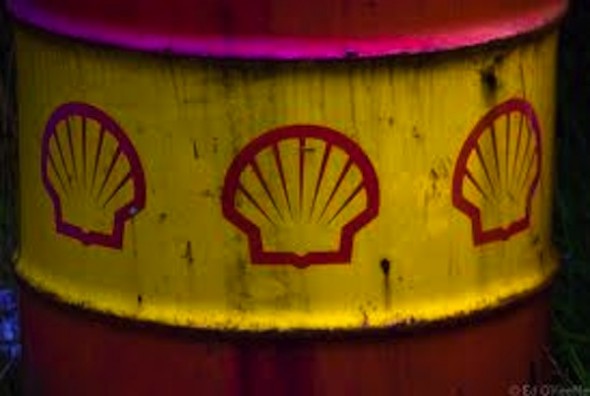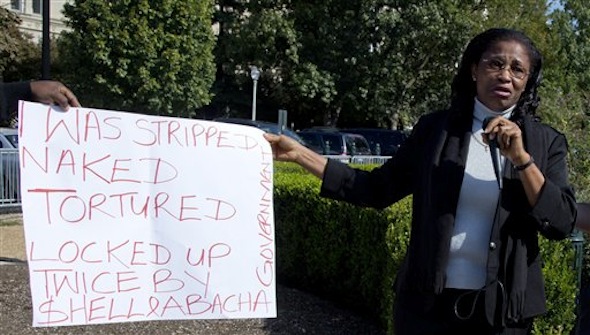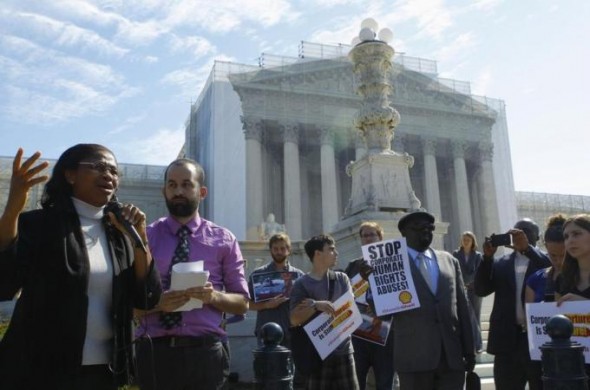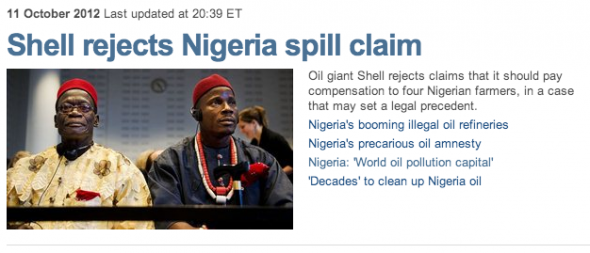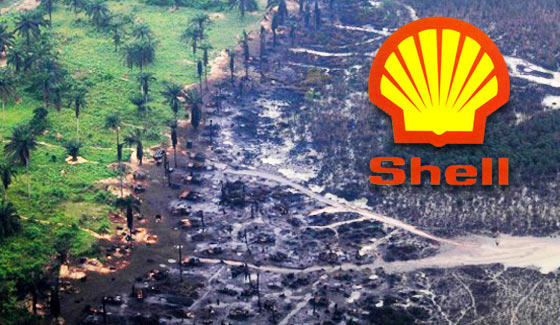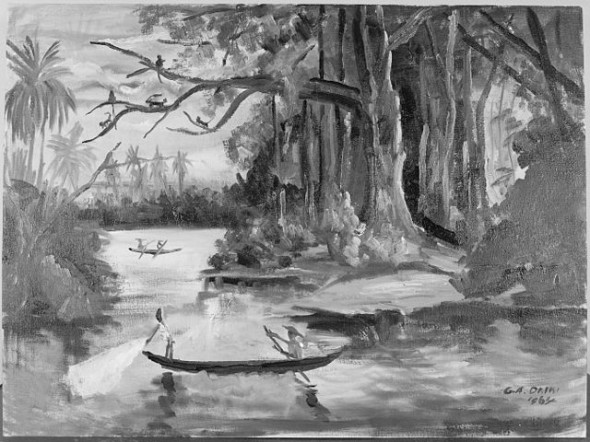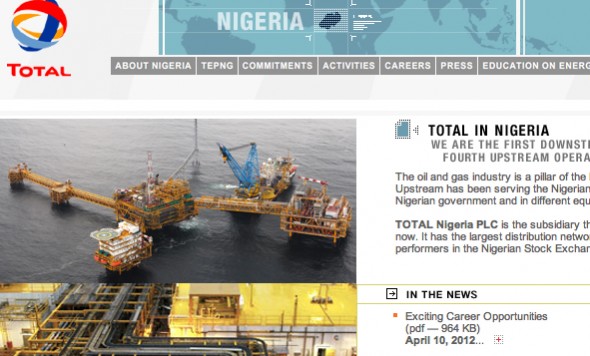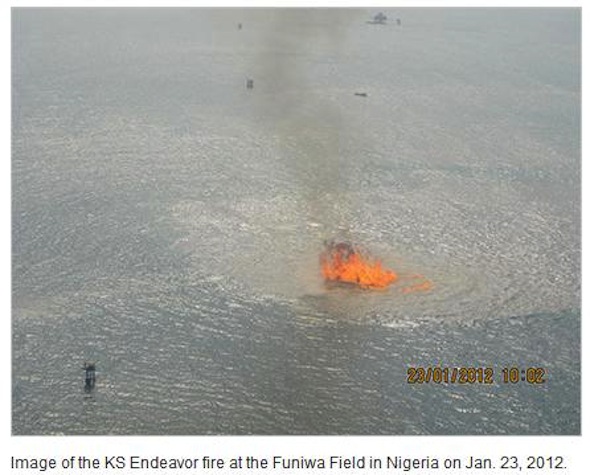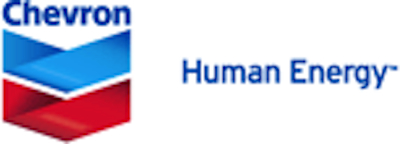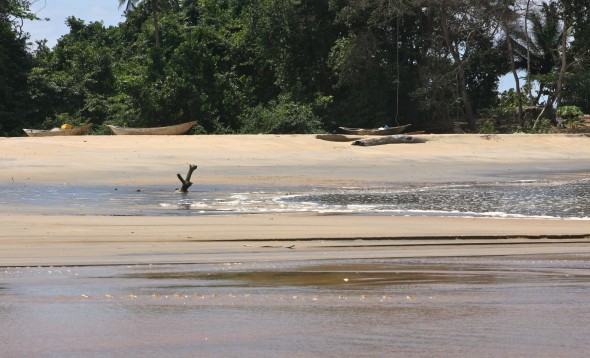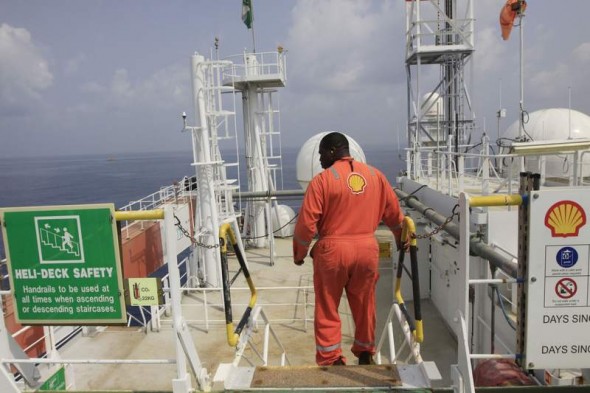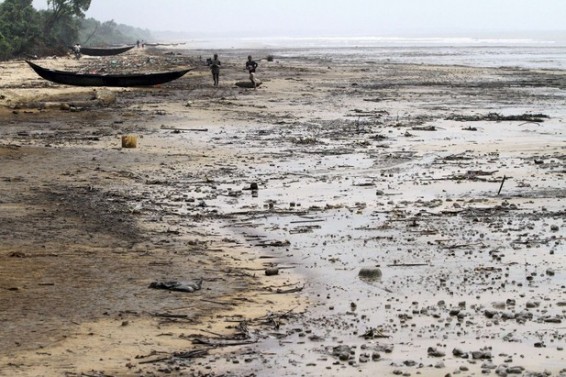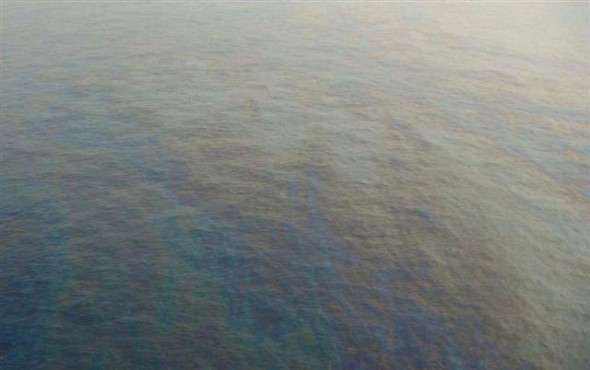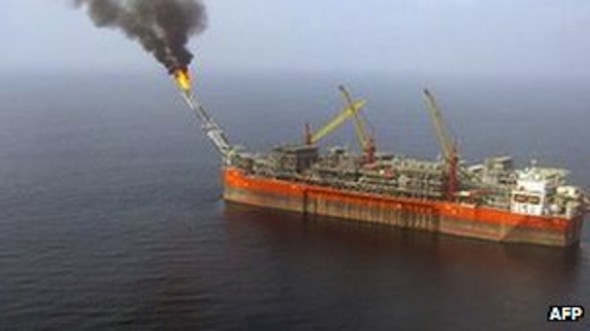Ken Wiwa, Nigerian author and activist, dies at 47
Gone, far too soon.
“The president of Nigeria has joined politicians, environmental activists and others to pay tribute to Ken Wiwa, the Ogoni leader and critic of Shell and other western oil companies in the Niger delta, who has died from a stroke in London.” Read the full story in The Guardian.
“Educated in Nigeria and Britain, Mr. Wiwa moved to Canada in 1999 and became a writer-in-residence at Massey College in the University of Toronto. He wrote features and columns for The Globe and Mail and was twice nominated for a National Newspaper Award….He wrote for many other international media, including The Guardian and the New York Times, and produced and narrated radio and television documentaries for CBC and BBC.
“Mr. Wiwa returned to Nigeria in 2005. Believing that he could help Nigeria more effectively by working within the government, he served as a special assistant to three Nigerian presidents, including Goodluck Jonathan, with whom he worked closely. He worked as a special assistant on issues such as conflict resolution, reconciliation and international relations. Much of his work focused on the Niger Delta, still plagued by the environmental disasters that his father had tried to prevent.” Read the full story in The Globe and Mail.
Shell Shareholders at Risk from Billion Dollar Nigerian Oil Scandal, says Global Witness
Following is a press release from Global Witness:
Shell‘s role in a billion dollar corruption scandal in Nigeria poses significant hidden risks for investors, Global Witness said at the company’s 2015 AGM. The warning comes as the oil major is lobbying the UK and US authorities to undermine the implementation of new transparency laws which would consign such secretive deals to history.
The corruption at the heart of the deal deprived the Nigerian state of over U.S. $1.1 billion, triggered investigations by authorities in three countries, and could potentially lead to Shell and its Italian partner Eni losing access to the oil block.
Kiobel v. Shell: U.S. Supreme Court issues decision
Today the U.S. Supreme Court issued its decision in the Kiobel v. Shell case, limiting the courts’ ability to hear claims of human rights abuses committed abroad.
Lawrence Hurley of Reuters calls the disappointing decision, “a major victory for multinational companies,” adding that “the ruling is a major win for multinationals such as Royal Dutch that do business in the developing world and become embroiled in local political controversies.
“Those companies, which are still subject to lawsuits in foreign courts, fear U.S. courts because of the possibility of large damage awards,” Hurley writes. He goes on to note that, “The ruling is likely to affect other cases, including those involving similar claims against Anglo-Australian mining company Rio Tinto Plc over its conduct in Papua New Guinea; Exxon Mobil Corp over its activity in Indonesia; and Daimler AG concerning alleged abuses in Argentina. The companies have all vigorously contested the claims.”
Human Rights First goes further, saying the Kiobel ruling “undermines U.S. leadership on human rights.”
In its press release, the organization writes, “Today in its decision in Kiobel v. Royal Dutch Petroleum, the Supreme Court gutted the Alien Tort Statute (ATS), a law that has been on the books for more than 200 years and for the last 30 years has been a critical avenue to hold serious human rights violators accountable. In a decision that will undermine the United States’ status as a leader on human rights, the Justices unanimously decided that the victims of the gross human rights violations alleged in this case were not entitled to relief under the ATS. Furthermore, a majority of the Court ruled more broadly that the ATS does not apply to human rights violations committed in other countries.
Some good background reading while waiting for the Kiobel decision
“This may be the week that the Supreme Court finally issues a decision in the landmark Alien Tort Statute case, Kiobel v. Royal Dutch Petroleum,” international law expert John Bellinger wrote on March 24th. “Whether or not a decision is issued this week,” he adds, “most Kiobel watchers believe that the Court will rule in favor of Shell. But on what basis?”
He goes on to outline various legal theories that may persuade the judges (and leave human rights activists discouraged). Read the post here: Will the Supreme Court Issue a Decision in Kiobel This Week?
We’re still waiting for the decision and in the meantime I’m posting an opinion piece by Lauren Carasik, Director of the International Human Rights Clinic at Western New England University School of Law. This piece originally appeared on the Al Jazeera website. I’m posting the article in its entirety below as it gives a good overview of this case and the larger issue of transnational corporate liability for human rights abuses.
Indeed, as the Center for Justice and Accountability (CJA) writes in its overview of the Kiobel case, “The stakes are extremely high because the ATS is the only avenue for most human rights victims to hold perpetrators accountable. In the home countries of many victims, there is no legal forum available to seek justice. The Supreme Court is considering removing the U.S. as their last resort.
The crazy world of Nigerian oil
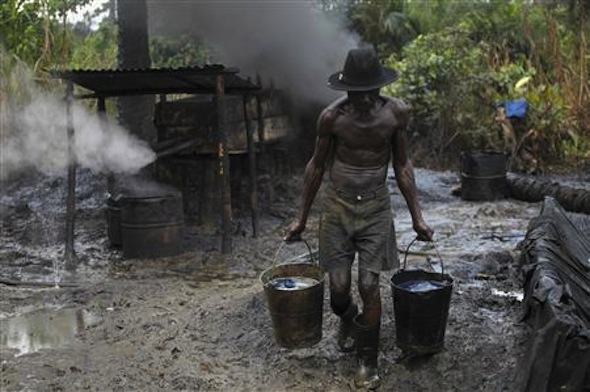
Ebiowei, 48, carries refined oil in buckets at an illegal oil refinery site. Credit: REUTERS/Akintunde Akinleye
Nigeria is experiencing difficulties selling its crude oil, but imports most of its refined oil products. No, that is not a mistake.
Nigeria Bearing Brunt of U.S. Shale Oil Boom is the title of a recent Wall Street Journal article. As the title suggests, increased domestic production in the U.S. has had a serious impact on Nigerian oil sales:
Exports of Nigerian oil to the U.S. almost halved between 2011 and 2012, according to (U.S. Energy Information Administration) data. In the late 2000s, Nigeria regularly shipped around one million barrels a day of crude to the U.S., but last year that number was just 405,000 barrels a day.
Other members of OPEC have also been affected. Exports from both Angola and Algeria fell more than 30% last year. But the impact has been the most severe in Nigeria, which has historically sent the bulk of its oil exports to the U.S., and the country has been forced to react.
Shell on trial in The Netherlands
“For the first time in history, a European company, Anglo-Dutch oil giant Shall, has been brought to court in The Netherlands for damages it caused abroad. The plaintiffs are four Nigerians whose livelihoods and communities have been massively impacted by Shell’s operations.” From Friends of the Earth International. Read more and watch video here.
“If their case is successful it could pave the way for thousands of other compensation claims, says the BBC’s Anna Holligan in The Hague.” From the BBC. Read the full coverage of the day in court here.
ExxonMobil, Shell, abuse and accountability
Mother Jones magazine has published, Did ExxonMobil Pay Torturers?, by Ian T. Shearn and Laird Townsend. The article details ExxonMobil’s possible involvement in human rights abuses in Indonesia and the victims’ decade-long struggle for justice.
“In June 2001,” the authors write, “John Doe III and 10 other civilian neighbors of ExxonMobil’s Arun natural gas facility filed a lawsuit against ExxonMobil in federal district court in Washington, DC. In John Doe v. ExxonMobil, the villagers charge the company with complicity in torture, arbitrary detention, and extrajudicial killings allegedly committed by Indonesian soldiers it hired to provide security.”
Shell in the Niger Delta: the endless wait for clean-up
A team of assessors from the U.K. has just returned from a fact-finding mission to the Niger Delta and has slammed Shell for failing to clean-up pollution resulting from two 2008 spills. “Next to nothing has happened and where work has commenced it has been totally amateurish,” said said Martyn Day of the London-based law firm Leigh Day, speaking to John Vidal, environment editor at The Guardian.
You can read the article, Shell attacked over four-year delay in Niger Delta oil spill clean-up, for more details on Shell’s failure to get serious about cleaning up the extensive damage from the spills.
This is merely the latest in a series of damning critiques of Shell’s failure to clean up its pollution. Shell initially denied responsibility for the spills and when the company did accept responsibility it “dramatically underestimated the quantities” of oil spilled.
Oil spill offshore Nigeria worsening
SweetCrude reports that an ExxonMobil spill off the coast of Nigeria is worsening:
THE oil spill near ExxonMobil oilfield off the coast of Ibeno, Akwa Ibom State, southeast of Nigeria has spread along the shore for about 15 miles, and locals said it was killing fish they depend on to live.
Mobil Producing Nigeria, a joint venture between ExxonMobil and the state oil firm, said this month it was helping clean up an oil spill near its Ibeno field in Akwa Ibom state, though it did not know the source of the oil.
Oil pollution, sabotage and security
I’m finally back at my desk, catching up with news and writing.
Oil watchdog Platform has published a briefing, Dirty Work, revealing Shell’s financial links to human rights abusers in Nigeria.The company spends hundreds of millions of dollars on security forces to protect its workers while the suffering of local communities continues unabated.
This briefing arrives a year after the publication of a U.N. report that slammed multinational oil companies, Shell in particular, for a half century of pollution in the Niger Delta. A recent Reuters article, A year on, Nigeria’s oil still poisons Ogoniland, describes the situation today:
U.S. Supreme Court: Shell Nigeria gets a boost from Obama administration
Democracy Now! May 26, 2009 report on opening of trial in NY federal court over Shell’s role in 1995 execution of human rights activist Ken Saro-Wiwa
Marco Simons, Legal Director at Earth Rights International, has recently written an article, US government sides with Shell over victims of crimes against humanity, which I’m posting below in its entirety.
Shell had asked the U.S. Supreme Court to rule the company can’t be sued by Nigerians seeking damages for torture and murders committed by the national government in the early 1990s. With a U.S. government brief that supports Shell’s position, where does this leave Nigerians? The U.S. brief suggests that the Nigerians should seek redress in their own courts, as the human rights abuses occurred in Nigeria and not the U.S. This is a chilling message.
China, Nigeria and oil
Oil’s curse sends millions abroad in search of opportunity.
I’m back from China where I spent a few weeks working with the Nigerian community of Guangzhou on a project that has nothing to do with oil. That said, oil came up in virtually every conversation I had with Nigerians: The oil money that has corrupted the country, killing off business enterprise and agriculture. The oil pollution that has ravaged the Niger Delta for decades, ruining countless lives and the environment.
Many people asked me when I would go to Nigeria to report on that country’s oil curse. Over and over again, people asked me why the BP Deepwater Horizon disaster was covered by the media and — most importantly — cleaned up, while the Niger Delta disaster is left untouched and rarely gets mentioned in the international press.
Total: Two gas leaks, two reactions
Jon Gambrell, Associated Press in Lagos, has reported that French oil company Total acknowledged on Saturday that one of its gas operations in the Niger Delta is leaking and that this “may have been going on for weeks.”
Gambrell writes, “Total’s Nigerian subsidiary hasn’t made any public statement about the leak since it likely began following an incident March 20, though the company has given near-daily updates about a similar leak at a plant off the United Kingdom in the North Sea.
Chevron says Nigerian rig fire extinguished
After suggesting that the rig fire off the coast of Nigeria could burn “for months,” Chevron has announced that it is no longer burning.
Apparently the fire stopped burning by itself several days ago, as gas was no longer flowing from the well. I have read differing accounts about why the gas stopped leaking, but at this point Chevron can’t guarantee that this is the end of the story. The company is continuing with relief well drilling.
There is still no information available on environmental damage or compensation for fishermen and villagers who say that both their livelihoods and their health have suffered as a result of the 45+ day fire. For more than one month now, there have been news reports of tests to determine contamination levels. But we’ve yet to see any results.
Chevron’s Endeavour rig: the story changes, but the fire still burns
Al Jazeera report February 4, 2012
First there’s news of a rig fire, which turns out to be much more than just a fire. In fact, it’s an exploratory gas well burning uncontrollably. That’s called a blowout and it’s what happened to the Macondo well in the Gulf of Mexico. The well spews oil or gas until it can be “killed.”
Chevron, the owner of the Endeavour rig, does not use the term blowout. But the company did admit that drilling a relief well would be necessary to cut off the flow of gas. A few days ago, company officials announced that drilling of the relief well had started.
Now, we have an update from the BBC. Speaking to a BBC reporter, Chevron spokesman Lloyd Avram has acknowledged that, “A gas-fuelled fire, with flames as high as 5 meters, may burn for months in waters off the Niger Delta in south-east Nigeria.”
Nigeria: Chevron starts drilling offshore relief well
For more than one month, the Chevron Funiwa 1A gas well has been burning uncontrollably off the coast of Nigeria.
I posted some information about this rig fire, caused by an apparent well blowout on January 16th. The fire claimed the lives of two rig workers. On January 26th, Chevron announced that the company was, “finalizing plans to commence drilling two relief wells.”
Nigerian well blowout? Chevron to begin drilling relief wells
In the coming days I plan to post a few short pieces with additional information on offshore drilling oversight (or lack of), the subject of my recent article on iwatch news.
In the meantime, though, I want to put up a quick post about the Chevron rig that has been burning uncontrollably off the coast of Nigeria since January 16th.
Bonga spill investigation ordered
The Nigerian government has mandated an investigation into the cause and effect of the Bonga oil spill on December 20th.
An NGO has also raised questions regarding Shell’s use of dispersants without any monitoring or assessment plan.
Fishermen are blaming the spill for a dwindling fish supply and rising prices.
Meanwhile, Shell is moving ahead with its plans to drill in the Arctic waters off Alaska.
“The polluter is strangely in charge of the regulators.”
That’s a perfect line to sum up the oil industry in Nigeria.
Day two of the general strike and ongoing sectarian violence have pushed news of the Bonga field oil spill to the back pages, but in the end it’s all about oil. Whether it’s pollution on the beach, corruption or violence, the source of Nigeria’s malaise is oil.
But back to that line, “The polluter is strangely in charge of the regulators.” That’s from an editorial that appeared on January 9th in the Nigerian Compass.
Bonga field: Back to business as usual
LAGOS, Nigeria — Royal Dutch Shell PLC’s Nigerian subsidiary says it has resumed production at a 200,000 barrel-per-day oil field after containing the worst Nigeria offshore spill in more than a decade.
Spokesman Tony Okonedo said in a statement Thursday that steps had first been taken to ensure it was safe to restart production at the Bonga deep-water oil field.
That’s the word from the Associated Press. Reuters adds a bit more information:
Nigerian villagers say oil from the spill at Bonga, 120 km offshore, had washed up on the coast, blackening stretches of it and killing fish, but Shell has denied that the oil could be from the Bonga facility.
2012 off to a rocky start in the Gulf of Guinea
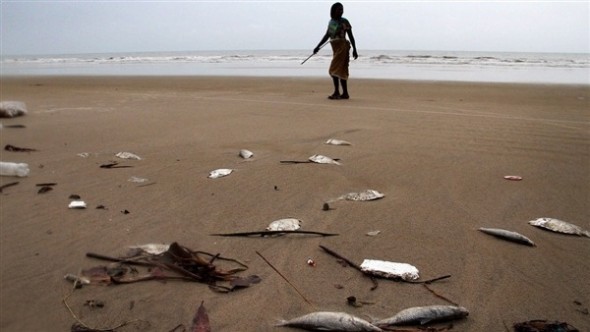
A woman walks past some of the hundreds of dead fish believed to have been killed as a result of the recent oil spill off the coast of Nigeria. Photo: George Esiri/EPA
The 40,000 barrel (1.68 million gallon) oil spill that occured sometime around December 20th at Shell’s Bonga facility 120 km off the coast of Nigeria has not been good for the new year.
Well, I should qualify: it hasn’t been good for Nigerians. Nigeria’s largest offshore spill (as opposed to onshore, where larger spills have certainly occurred) in more than a decade hasn’t made a dent in Shell’s stock price and is only getting minimal media coverage outside the country.
As I wrote a few days ago, Shell announced that clean up crews had “contained” the spill before it hit land. According to the company, clean-up crews, dispersants and nature worked together to prevent the spill from arriving onshore. At the same time Shell reported that clean-up crews had discovered a second spill — one that reached land — having nothing to do with the Bonga oil leak.
Shell continues to deny that the onshore mess has anything to do with the Bonga field spill, but many are doubting those claims. The amount of oil that has washed ashore looks substantial (Euronews has produced a short video report that includes villagers showing barrels of oil they’ve shoveled up: Coastal pollution fears after Nigeria oil spill). Could this really be the result of a passing tanker spill/dump? Shell said the company would analyze the oil on the beach to prove it has nothing to do with the Bonga facility.
More Nigeria news from SkyTruth
Why do we hear so little about spills in the Gulf of Guinea region? Well, there are the officials and companies who don’t (seem to) give a damn. There are the restrictions on the press in a number of countries and the lack of resources for journalists across the region that hamper in-depth reporting. But there’s also the fundamental lack of oversight: we don’t hear much because the governments themselves don’t know much. They don’t have monitoring systems and are — far too often — at the mercy of the oil companies when it comes to getting information about spills and clean-up.
SkyTruth, an organization that seeks to create environmental awareness through the use of satellite imagery (“If you can see it, you can change it”), has been posting regular updates on the recent Bonga spill.
I’m reposting links to the last two pieces from SkyTruth, which get at several crucial points regarding the Gulf of Guinea: No one knows what’s going on because of the lack of monitoring and oil is being spilled or dumped all the time in the region. Remember the spill off the coast of Ghana in November? Was it from the Jubilee operations or a passing tanker? Who knows?
Continue reading . . .
Did someone say oil spill?
As the spill offshore Nigeria works its way to shore, the lack of information about what is actually happening is depressingly familiar.
Shell reports that less than 40,000 barrels were spilled (at 42 gallons per barrel, that’s something like 1.6 million gallons), but there’s no way to verify that information. Shell posted a photo of the source of the spill, a rupture in the line that carries oil from the offshore storage facility (the FPSO) to oil tankers.
Oil spill offshore Nigeria
News from Nigeria:
Nigeria in Race to Limit Shell Oil Spill
Lagos – Authorities rushed to prevent one of Nigeria’s worst recent oil spills from reaching the West African nation’s shoreline on Thursday, with production from a major Shell field also shut due to the leak.
Shell, which said the leak has been stopped, has estimated that less than 40 000 barrels of crude have spilled into the sea and was deploying ships with dispersants to attack the slick. Planes were also being mobilised.
It was Nigeria’s worst offshore spill since a 1998 Mobil incident, officials said, though onshore leaks have been estimated at levels far worse since that time in the oil-producing Niger Delta.


